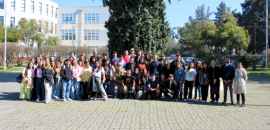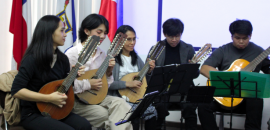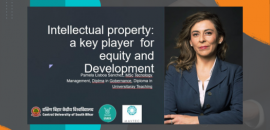- Español
- English
You are here
Culture, Cooperation and More: USACH Welcomed the Philippine Ambassador to Explore Potential Alliances
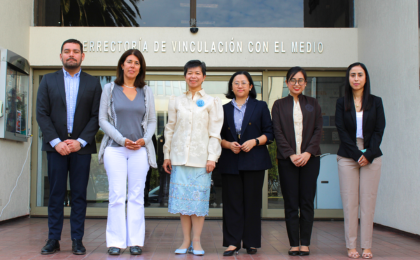
The University had its first meeting with the Philippine diplomatic representation in Chile, which allowed the identification of common interests in various areas.
The University of Santiago of Chile received a delegation from the Philippine Embassy in Chile, composed of Ambassador Celeste Vinzón Balatbát; Vice Consul Ramona R. Jose-Bullecer; and Cultural Officer Kimiko R. Gata. The meeting, which took place at the Vice-Rectory of Public Engagement and Outreach, allowed the identification of areas of mutual interest.
Representing USACH were Dr. Ana María Fernández Tapia, Vice-Rector for Public Engagement and Outreach; Fernando Olmos Galleguillos, Director of the Department of International Relations; and Mayerley Pacheco Piñango, Cooperation Coordinator of the same department.
During the meeting, which aimed to explore opportunities for cooperation with Philippine educational and research institutions, areas of mutual interest were preliminarily analyzed, such as astronomical outreach, sciences, mathematics and engineering, language training and studies, among others. Options for implementing various cultural activities through the VIME Extension Department in coordination with Usach Internacional were also discussed.
Initially, the joint activities that could be promoted would be aimed at strengthening the link between USACH and the Asian country. This stage would include actions such as visits by USACH Sin Fronteras (a volunteer student program coordinated and promoted by DRII for the past five years) to the Philippine Embassy, the promotion of informational talks to introduce study and scholarship opportunities, visits to the USACH Planetarium, among others. At the cultural level, the possibility of including a concert brought to Chile by the Philippine Embassy in the USACH concert lineup and the screening of Filipino films was evaluated.
In a second phase, the actions would aim to formalize collaboration in research, teaching, and outreach. This stage would advance a broad agreement on topics such as research internships and other academic agreements.
It is worth noting that both parties enthusiastically welcomed the possibility of exploring various opportunities for international cooperation, exchanging experiences, best practices, and joint research projects, promising positive developments in the relationship. Finally, it is important to highlight that the collaboration between USACH and the Philippine Embassy is significant for promoting international cooperation in education, knowledge exchange, and mutual understanding, laying the foundation for a lasting and beneficial relationship between institutions of both nations.
News
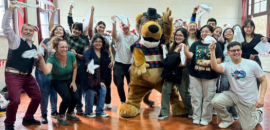 International students learn cueca with Usach Without Borders and Department of Cultures and Arts
International students learn cueca with Usach Without Borders and Department of Cultures and Arts
12 Sep 2024
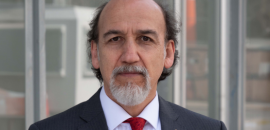 Rector Vidal to join the Governing Board of UNESCO's International Institute for Higher Education
Rector Vidal to join the Governing Board of UNESCO's International Institute for Higher Education
2 Sep 2024
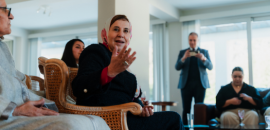 Students visited the Ambassador of Morocco to learn about the country's diplomatic work and culture
Students visited the Ambassador of Morocco to learn about the country's diplomatic work and culture
25 Jul 2024

